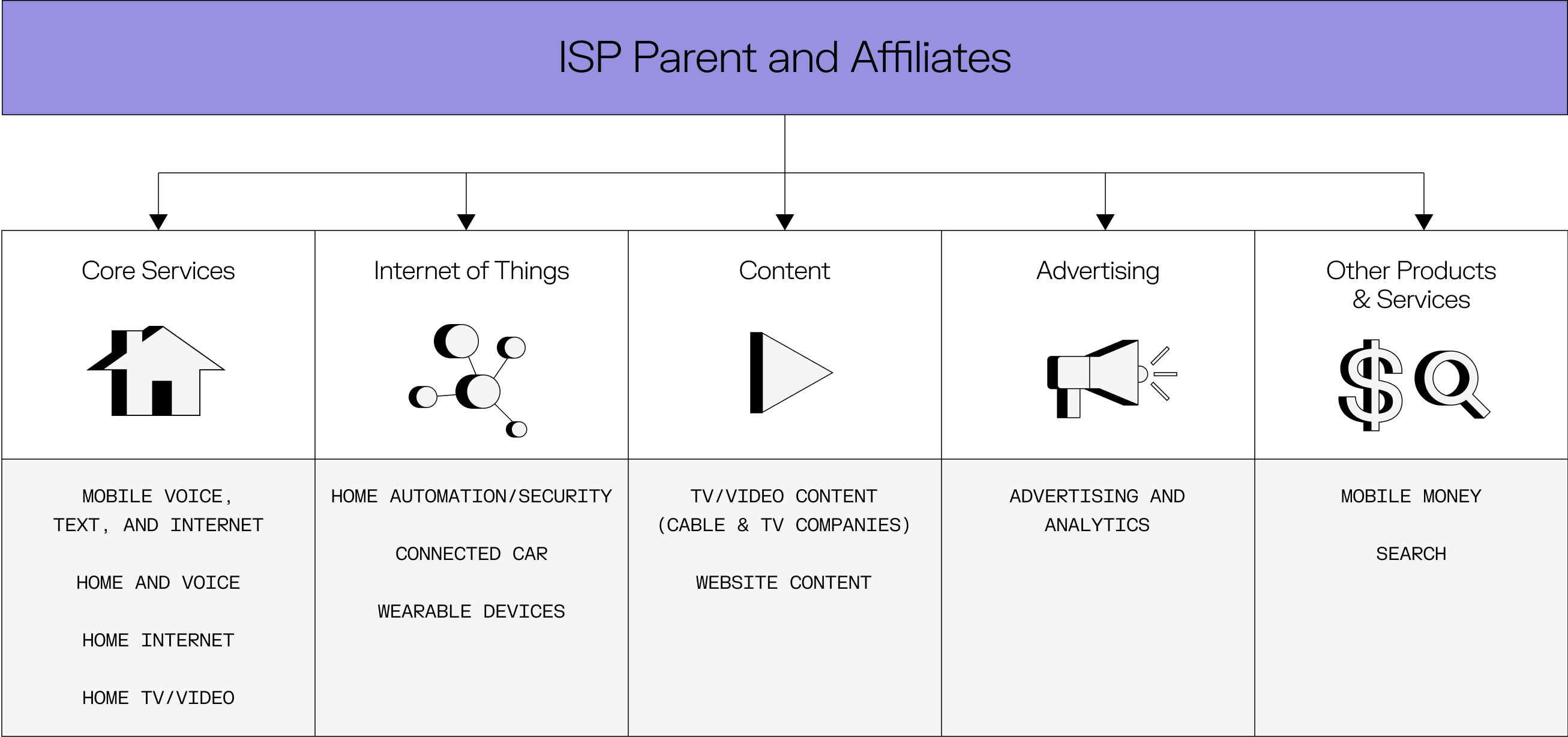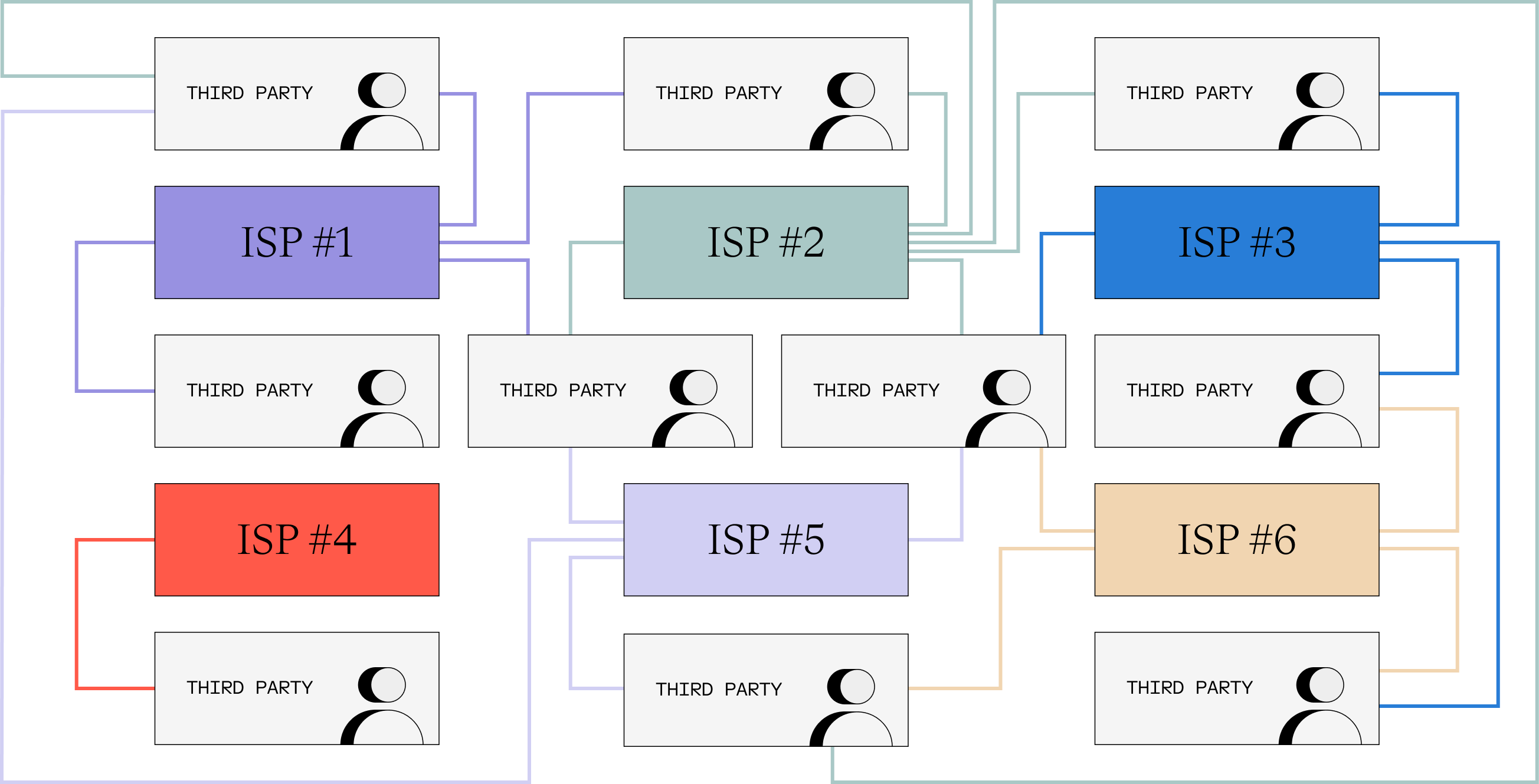Nearly every American uses the internet, each spending an average of seven hours per day online. The internet has become a critical avenue for how we communicate, access information, conduct business, and entertain ourselves. However, this constant connectivity comes with a significant trade-off: our privacy.
You’re likely aware of how reliant we all are on the internet, and how much of our lives and digital activities are tracked by the likes of Meta and Google. Yet, you may be surprised at how little you know about the one providing you with this critical service—your mobile carrier—and the magnitude and depth of their data collection processes.
In all likelihood, your mobile carrier does much more than provide cellular service, and is a full-fledged Internet Service Provider (ISP) that oversees your access to the Internet both at home and on-the-go. The nation’s top telcos–Verizon, AT&T, and T-Mobile–are all major ISPs for home Internet, and the top cable companies like Comcast (Xfinity) and Charter (which owns Spectrum) have all moved into providing wireless services. In the meantime, big tech giants like Google have launched their own telco in Google Fi, while Amazon has deployed satellite-based broadband services.
As a result, a growing number of Americans are channeling nearly the entirety of their digital lives through a single conglomerate, with a record-high share of people getting their wireless and home Internet from the same company.
Over the last few decades, these major ISPs have expanded their reach, transforming into a network of vertically integrated platforms that control not only the internet, cable, and mobile services, but also content distribution, advertising, and analytics. For example, Comcast's acquisition of NBC Universal in 2011 marked the first time a cable company controlled a major broadcast network. Similarly, Verizon's purchases of AOL in 2015 and Yahoo in 2017 created a vast media and technology conglomerate.
As gatekeepers to the internet, ISPs already hold the keys to a comprehensive trove of your online activity data and personal information. But this integration has exponentially increased the volume of consumer data accessible to ISPs, enhancing their ability to track and profile users to an astonishingly granular degree across various services and platforms.
A 2021 Federal Trade Commission (FTC) Staff Report highlights the extensive data collection practices of the largest ISPs, which collectively cover approximately 98.8% of the mobile internet market. The report made several key findings, which we summarize below.
ISPs Can Be As Privacy-Intrusive As Major Ad Platforms.
Despite being smaller than Google, Facebook, or Amazon, ISPs can be just as intrusive. They have access to all unencrypted internet traffic, can see and verify subscribers' identities, track users persistently across websites and locations, and combine this browsing and viewing data with information from their extensive range of services. This amplification of privacy challenges makes ISPs powerful players in the data and advertising ecosystem.
ISPs Pool Large Amounts of Data to Create Comprehensive Consumer Profiles.
The vertical integration of ISP services with other services—such as home security and automation, content creation, TV streaming, advertising, email, search, wearable devices, connected cars, and more—allows ISPs to collect large quantities of incredibly granular data about a single subscriber, creating a comprehensive consumer profile. Additionally, ISPs often combine this data with information bought from third-party data brokers (see graphic). Through this system, not only is your ISP able to learn extremely specific demographic and interest information about you, but the third parties are able to as well.
ISPs Collect and Use Data in Unexpected and Harmful Ways.
You may think it’s obvious that ISPs will collect certain data for internet services. However, the extent to which data is collected and combined is not well known, and is often for unrelated and unnecessary purposes—such as browsing data, app usage history, TV viewing history, email contents, connected devices, real-time location, and even demographic data like race, ethnicity, marital status, sexual orientation, religion, political affiliations, or income level.
In fact, ISPs use this data to place consumers into “segments” that reveal intimate details about their lives.
Examples of such highly-sensitive segments include "Asian Achievers," "Pro-Choice," "Jewish," "African American," “Working Class,” “Seeking Medical Care,” “Investor High-Value,” “Tough Times,”and "Conservative."
See the full list of segments that the FTC uncovered at the end of this blog. These profiles allow advertisers to target consumers with precision, and can be misused and abused, potentially harming consumers if accessed by the likes of property managers, bail bondsmen, bounty hunters, or anyone with discriminatory intent.
How big are these conglomerates?
- AT&T services approximately 16 million residential broadband and 72 million mobile subscribers. In 2018, AT&T acquired Time Warner. AT&T’s advertising unit, Xandr, reaches 135 million unique customers per month. AT&T also offers a range of IoT products, such as connected cars and connected home automation/security solutions.
- Verizon services around 100 million mobile subscribers and 11.1 million residential broadband subscribers. Verizon can access consumer information from its affiliates, including advertising and content-creating entities like Verizon Media, Yahoo, and TechCrunch, and IoT entities like Hum by Verizon and Verizon Connect, which provide connected car diagnostic services.
- Comcast has about 32.3 million subscribers. The company owns a digital advertising platform that focuses on multi screen ads across TV, laptop, and mobile devices, which reach more than 35 million households across the U.S. Comcast also owns connected home services under the Xfinity brand, Xfinity mobile for mobile data plans, website content, TV networks, and even amusement parts and other entertainment properties under NBCUniversal.
- Charter offers video, voice, and residential and mobile internet to approximately 32 million subscribers through its Spectrum brand. Charter also runs regional sports and news networks, as well as an advertising platform, Spectrum Reach, offering multi-channel and cross device solutions for advertisers.
- T-Mobile has approximately 100.1 million subscribers. The company continues to offer products and services beyond the provision of the internet, such as financial services, live streaming TV, wearable device solutions, and an advertising platform.
- Google Fiber has relatively low subscribership compared to other ISPs, offering high-speed gigabit internet and TV streaming services in twenty cities. However, Google Fiber is also a subsidiary of Alphabet, Inc.—primarily an online advertising company—which accounted for 26% of all digital advertising revenue in the United States in 2024. In contrast to the traditional pathway of ISPs entering the advertising space, Google Fiber is an internet advertiser entering the ISP space.
As this list demonstrates, many of the telcos in this study are not simply providers of internet connectivity; they are technology giants. For perspective, in 2024, on the Fortune 500 list:
- Google Fiber (Alphabet) ranked 8th, generating $182 billion in revenue;
- AT&T ranked 27th, generating over $164 billion in revenue;
- Verizon ranked 44th generating $136 billion in revenue;
- Comcast ranked 64th with $121 billion in revenue; and
- Charter ranked 110th with $54 billion in revenue.
- T-Mobile is partly owned by German company Deutche Telekom and is therefore not on the Fortune 500 list, but it generated $115 billion in annual revenue.
If telcos have monopolized all aspects of my connectivity to the digital world, what can I do?
These six major telcos are everywhere you look, making up 98.8% of the mobile internet market. It understandably can feel like there are no meaningful options to protect your digital privacy. However, there are choices you can make to secure your data and shield your personal information from the conglomerates and the third parties they work with to monetize your digital identity.
One important step to take is to switch to a secure mobile carrier, like Cape. Cape provides customers with premium cell phone service, with a commitment to protect your privacy and security, first and foremost. At Cape, we believe your data belongs to you, and you alone.
- We collect the minimum amount of data possible to provide you with our service.
- We do not pool your data across different services, or share it with ad brokers or other third parties.
- We do not use your data to profile you.
- We will never sell your data.
- We default to deleting any data that we don’t need for the sole purpose of providing you with our service.
- We don’t hide behind legal jargon—our privacy policy is written in plain language, to encourage you to actually read it.
Your privacy is built into the core of what Cape is building. By switching to Cape, you opt out of one of the major channels through which your data is collected, pooled, and monetized. Cape’s mission is to provide you with premium, anonymous, and secure wireless coverage, allowing you to take control over your digital privacy and protect your personal information from being exploited for profit.
Illustrative List of Segments:
These categories allow advertisers to target consumers by their race, ethnicity, sexual orientation, economic status, political affiliations, or religious beliefs, raising questions about how advertisers might harm historically marginalized groups or reveal sensitive details about consumer’s browsing habits.
Combined Segments
Demographic Data
Political Data
Phone Data
Browsing Data
TV Data
Interests Data
Shopper Data



